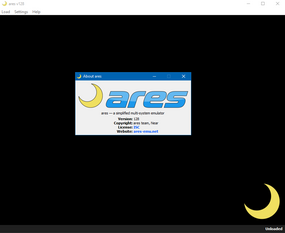ares

| |
| Developer(s) | Near (formerly known as byuu), LukeUsher |
|---|---|
| Latest version | v137 [+] |
| Active | Yes |
| Platform(s) | Windows Linux macOS |
| Architecture(s) | x64 |
| Emulates | Atari 2600 NES SNES Nintendo 64 Game Boy/Color Game Boy Advance WonderSwan Sega SG-1000 Sega Master System/Game Gear Sega Genesis/Mega Drive Sony PlayStation PC Engine/TurboGrafx-16 Neo Geo AES Neo Geo Pocket/Color MSX ColecoVision Sinclair ZX Spectrum Pocket Challenge V2 |
| Website | ares-emu.net |
| License | Internet Systems Consortium (ISC) license |
| Source code | GitHub |
ares is a free and open-source, multi-system emulator. It is a descendent of higan and bsnes, and focuses on accuracy and preservation.
Download
| Official releases | ||
| Flatpak ArchLinux AUR | ||
Overview
ares began development as bsnes on October 14th, 2004. It is available under the Internet Systems Consortium (ISC) license, which is a permissive license that is functionally similar to the BSD and MIT licenses. It used to be under the terms of the Creative Commons (CC) BY-NC-ND 4.0 license, which it made the ares emulator a non-commercial software that does not permit publishing modifications (forks) online. The reason for this was to prevent splintering development between higan and ares.
Most cores in ares are original and were started when the project was run by Near, although its Nintendo 64 core's graphics emulation is based on Themaister's ParaLLEl-RDP Vulkan renderer as well as MAME's software renderer, and an original Atari 2600 core was added later. Its most useful cores are the ones that have been in development the longest or that have few competing options. Its SNES emulation is derived from that of the original bsnes project and is the most accurate one around. Its WonderSwan and Neo Geo Pocket emulation are also the most complete and accurate, with the highest compatibility available (100% in the case of the WonderSwan). The 32x emulation has 95% compatibility with commercial games and is by far the best option for that system.
Other cores are less useful, with known incompatibilities and other emulators available that are both faster and more accurate. The GBA emulation was derived from work done in bsnes for the ST018 coprocessor and is highly accurate, but is slower and less accurate than mGBA. The Genesis emulation lacks the 100% compatibility with commercial games claimed by other emulators. Its Atari 2600 emulation is well behind Stella and MAME.
Features
- Native multi-platform UI
- Adaptive sync
- Dynamic rate control
- Save states
- Run-ahead
- Rewind and fast-forward
- Pixel shaders
- Color correction
- 6th-order IIR audio filtering
- Input multi-mapping
- Built-in games database
- Debugger
- Windows: VBA-M • mGBA • higan • iDeaS • MAME • Meteor • NanoBoyAdvance • No$GBA • ares
- Linux: mGBA • MAME • NanoBoyAdvance • ares
- macOS: mGBA • NanoBoyAdvance • ares
- PSP: TempGBA4PSP • gpSP
- PSVita: mGBA
- DS: GBAemu4DS
- 3DS: CitrAGB • mGBA
- Wii: VBA-GX • mGBA
- Android/iOS: mGBA (RetroArch) • VBA-M/VBA-Next • My Boy! ($) • GBA.emu ($) • Gameboid
- Cell-phones: vBagX ($)
- Web Browsers: VBA-M-js
- Game Boy Advance emulators
- Emulators
- Multi-emulators
- Console emulators
- Home console emulators
- Handheld console emulators
- Arcade emulators
- Computer emulators
- Nintendo Entertainment System emulators
- Super Nintendo emulators
- Nintendo 64 emulators
- Game Boy/Game Boy Color emulators
- WonderSwan emulators
- SG-1000 emulators
- Master System emulators
- Sega Genesis emulators
- PlayStation emulators
- PC Engine (TurboGrafx-16) emulators
- Neo Geo Pocket/Neo Geo Pocket Color emulators
- MSX emulators
- ColecoVision emulators
- ZX Spectrum emulators
- Windows emulation software
- Linux emulation software
- MacOS emulation software